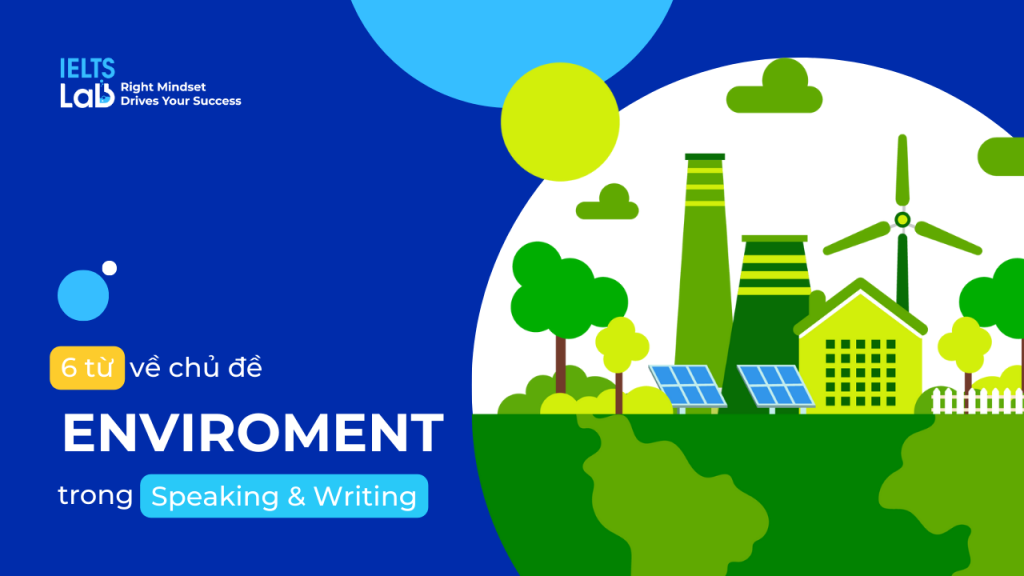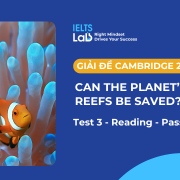Môi trường (Environment) là một chủ đề rất hay gặp không chỉ ở trong IELTS Writing mà thậm chí cả ở trong IELTS Speaking, đặc biệt là part 3. Chính vì vậy, nhằm hướng tới việc học mà có thể ứng dụng được cả hai kỹ năng cùng một lúc, bài viết sau đây của IELTS Lab sẽ giới thiệu với các thí sinh một số từ thuộc trình độ C1&C2 theo khung tham chiếu châu Âu như sau.

Từ vựng về chủ đề Môi trường (Enviroment) trong Speaking & Writing
1) Ascribe (v): quy cho, gán cho
Ví dụ: The scientists ascribe the increase in sea level over the past century to a combination of factors, including melting glaciers and ice sheets, thermal expansion of the oceans due to warming temperatures, and human-induced greenhouse gas emissions.
(Các nhà khoa học cho rằng sự gia tăng mực nước biển trong thế kỷ qua là do sự kết hợp của nhiều yếu tố, bao gồm sự tan chảy của sông băng và các tảng băng, sự giãn nở nhiệt của đại dương do nhiệt độ ấm lên và phát thải khí nhà kính do con người gây ra.)
2) Deliberate (adj): cố ý, có chủ ý
Ví dụ: Deliberate actions taken by governments and individuals to reduce carbon emissions and mitigate the effects of climate change on the environment are crucial in preserving the planet for future generations.
(Các hành động có chủ ý của chính phủ và các cá nhân nhằm giảm lượng khí thải carbon và giảm thiểu tác động của biến đổi khí hậu đối với môi trường là rất quan trọng trong việc bảo tồn hành tinh cho các thế hệ tương lai.)
3) Hazard (n): mối nguy, nguy hiểm
Ví dụ: Although wind turbines generate clean energy, they pose a hazard to migratory birds due to collisions with the rotor blades, which can result in bird deaths and population declines.
(Mặc dù tua bin gió tạo ra năng lượng sạch nhưng chúng gây nguy hiểm cho các loài chim di cư do va chạm với các cánh quạt, có thể khiến chim chết và suy giảm quần thể.)
4) Irreversible (adj): không thể đảo ngược, không thể khắc phục được
Ví dụ: The melting of glaciers in the Himalayas due to rising temperatures is causing irreversible damage to the region’s ecosystems and water resources, as the loss of ice and snow will lead to decreased water availability during dry seasons and increased flood risks during monsoons.
(Sự tan chảy của các sông băng ở dãy Himalaya do nhiệt độ tăng cao đang gây ra thiệt hại không thể khắc phục được đối với hệ sinh thái và tài nguyên nước của khu vực, vì việc mất băng và tuyết sẽ dẫn đến giảm nguồn nước trong mùa khô và tăng nguy cơ lũ lụt trong các đợt gió mùa.)
5) Mutate (v): biến đổi, đột biến
Ví dụ: In response to the increasing threat of climate change, some species are mutating at an unprecedented rate in order to adapt to their rapidly changing environments.
(Để đối phó với mối đe dọa ngày càng tăng của biến đổi khí hậu, một số loài đang biến đổi với tốc độ chưa từng thấy để thích nghi với môi trường thay đổi nhanh chóng của chúng.)
6) Transpire (v): xảy ra
Ví dụ: The unexpected discovery of high levels of lead in the drinking water of a small town transpired during routine water quality tests conducted by local authorities, prompting immediate action to address the environmental health hazard.
(Việc phát hiện bất ngờ về hàm lượng chì cao trong nước uống của một thị trấn nhỏ xảy ra trong quá trình kiểm tra chất lượng nước định kỳ do chính quyền địa phương thực hiện, thúc đẩy hành động ngay lập tức để giải quyết mối nguy hại cho sức khỏe môi trường.)
Ứng dụng vào đề thi Speaking
Question: How do people in your country contribute to environmental conservation?
Answer: In my country, there are various initiatives taken by the government and the general public to conserve the environment. One such effort is the concept of reducing, reusing, and recycling, also known as the 3Rs. People are encouraged to ascribe less value to disposable items and instead, ascribe more value to reusable ones. This has led to a significant decrease in the amount of waste generated and has also reduced the demand for raw materials, thereby conserving natural resources. Additionally, there are campaigns to plant more trees and conserve water resources through rainwater harvesting techniques. These measures have contributed significantly to environmental conservation in my country.
Question: How can individuals contribute to preserving the environment in their daily lives?
Answer: One deliberate action that individuals can take to preserve the environment in their daily lives is to reduce their consumption of single-use plastics. This can be achieved by carrying a reusable water bottle, shopping bag, and utensils instead of using disposable ones. By making this conscious decision, we can significantly reduce the amount of plastic waste that ends up in landfills or oceans, which is a major environmental concern. Additionally, we can also conserve energy by turning off lights and unplugging electronics when not in use, as well as reducing water consumption by fixing leaks and taking shorter showers. These deliberate actions may seem small, but they can have a significant impact on the environment if adopted by a larger population.
Question: How can individuals contribute to reducing environmental pollution?
Answer: One way individuals can contribute to reducing environmental pollution is by promoting the use of renewable energy sources, such as solar or wind power, which are irreversible alternatives to traditional fossil fuels. By installing solar panels on their rooftops or investing in wind turbines, individuals can significantly reduce their carbon footprint and contribute to a cleaner and more sustainable environment. Additionally, they can conserve energy by turning off lights and appliances when not in use, which is also an irreversible habit that can have a positive impact on the environment.
Question: Can you tell me about any recent developments in environmental conservation?
Answer: Yes, one recent development that has caught the attention of scientists is the phenomenon of genetic mutation in certain species due to environmental factors. For instance, a study conducted in the Amazon rainforest found that some tree species are mutating at a faster rate than usual due to increased levels of carbon dioxide in the atmosphere. This mutation is allowing these trees to adapt to the changing climate and survive in conditions that would have been previously unfavorable. This discovery has important implications for conservation efforts as it highlights the need to consider the impact of climate change on genetic adaptation and how it may affect ecosystems in the future.
Question: How do people in your country contribute to environmental conservation?
Answer: In my country, there has been a growing awareness about the importance of environmental conservation in recent years. Many people have taken it upon themselves to contribute to this cause in their own ways. One interesting trend that has transpired is the rise of community gardens. These gardens are not only a source of fresh produce but also serve as green spaces in urban areas. They promote sustainable living by encouraging people to grow their own food and reduce their carbon footprint by cutting down on transportation costs. Additionally, these gardens often double up as spaces for community events and gatherings, fostering a sense of social cohesion and environmental consciousness. Overall, community gardens are a great example of how individuals can make a positive impact on the environment through small-scale initiatives.
Tổng kết
Với những từ trên, thí sinh IELTS sẽ dễ dàng xử lý các chủ đề liên quan đến môi trường cả ở kỹ năng nghe và kỹ năng nói. Thậm chí, những từ này sẽ giúp đẩy band của thí sinh cao hơn vì đó toàn bộ là những từ thuộc trình độ C1&C2 theo khung tham chiếu châu Âu.


















Trả lời